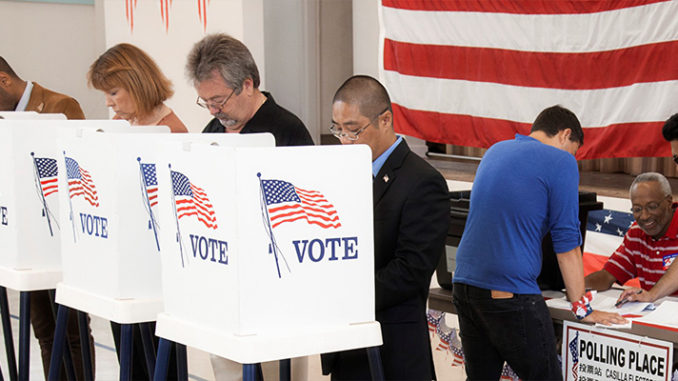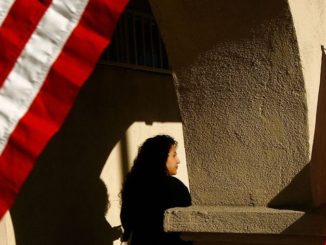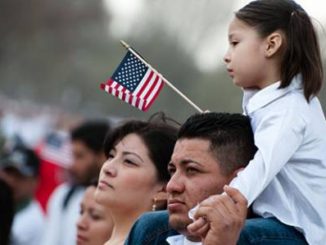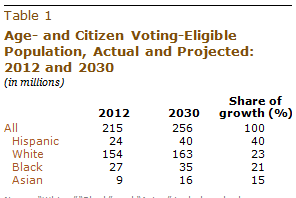
by Yesenia Amaro
Long considered a sleeping giant of the electorate by many, Latino voters in California are increasingly flexing political muscle at the ballot box — a development possibly sparked by President Donald Trump’s rhetoric against undocumented immigrants.
During the 2018 November midterm election, the eligible turnout rate for Latinos (the percentage of adult citizens who voted) was 35.9 percent — an 18.6 percent increase from the 2014 midterm election, according to data released by the University of Southern California’s Civic Engagement Project.
Mindy Romero, a research assistant professor and director of the California Civic Engagement Project at USC, said in Fresno County, the total voter turnout was 41.5 percent, and for Latinos eligible to vote, it was 30.3 percent. Statewide, the total voter turnout was 50 percent.
Some might argue that Latinos actually lost power in state government last year with the departure of former Sen. Kevin de Leon, who was the senate’s president pro tempore. And although they are the state’s largest ethnic group, Latinos are less than a quarter of the Legislature.
Still, the number of Latinos in state government appears to be growing.
The state’s Latino Caucus now has 33 members — a new record, according to caucus spokesman Roger Salazar. That includes five statewide office holders.
The USC data also comes amid many “firsts” for Latino politicians and legislators in Sacramento. For example, two Latinas are leading the state’s Latino Legislative Caucus for the first time — the caucus’ chair Assemblywoman Lorena Gonzalez, D-San Diego, and Sen. Maria Elena Durazo, D-Los Angeles, the vice chair, who grew up in Fresno.
Some members of the Latino Caucus have been active in pushing back against the Trump administration’s anti-immigration policies. For example, State Attorney General Xavier Becerra, who is also a member of the Latino Caucus, has sued the federal government 47 times as of this week.
One of the most recent lawsuit was filed over President Donald Trump’s declaration of a national emergency at the U.S.- Mexico border.
Was opposition to Trump behind midterm surge?
To put the latest USC statistics into perspective, back in 1994, when California voters approved Proposition 187, Latinos only accounted for 8 to 10 percent of those who voted in the election, according to UC Davis’ Migration Dialogue.
Prop. 187, which would have barred undocumented immigrants from receiving a variety of services, didn’t make it past federal court, and thus never became law.
Latino voters comprised 21 percent of total votes in the 2018 election, up from 15 percent in the 2014 midterm election, according to figures by Political Data Inc. and the California Civic Engagement Project.
Romero said it’s difficult to know exactly why more Latino voters went out to vote, as researchers would have to survey each individual voter. Latinos also include a range of cultures and political persuasions that include Republican and Democratic voters.
She noted there was more money and more Latino voter mobilization during the November elections, although those efforts still fall short of what’s needed to maximize that vote.
“But Trump and the mobilization that happened around him .. it appears made strong impact,” she said.
Gonzalez believes Trump, who has used words like “rapists” and “murderers” to describe Mexicans, played a role in the number of Latinos that took to the polls in November.
Many Latinos come from mixed and immigrant families, she said, and understand the “hatred” that has resulted in “bad policies” for Latinos communities from the Trump administration. “I think it is a motivating factor,” she said.
Many Latinos, Gonzalez said, didn’t believe that Trump would be elected as president and will now “never” allow their voices to go unheard. She believes there will be a “record turnout” for Latinos during the 2020 Presidential elections.
Experts also believe there’s a link between the rise in Latino voters in November and the large number of Latinos in elected office today.
Some say it was Latino voters who helped Democrats flip seven House seats during the midterm election.
“There is definitely research that shows that when you have a co-ethnic (candidate) on the ballot minorities are more likely to pay attention to the election,” said Annabella España Najera, associate professor with the Department of Chicano and Latin American Studies at Fresno State, in an email.
It’s known, España Najera said, that reaching out to certain populations that traditionally don’t tend to vote, makes an impact on voter turnout.
Many leaders say the growing visibility of Latinos in politics, particularly women, will lead to more representation.
Sen. Melissa Hurtado, D-Sanger, who was elected in November, said having two women at the helm of the Latino Caucus, especially one with a connection to the Central Valley, is “inspiring.” “To me, this is a pivotal moment — not only for my family but for the community where I was raised,” Hurtado said.
Currently there are 36 women in the state’s Legislature, and 15 of them are Latinas.
Hurtado said voters in November showed they were “not only ready for women to lead, but ready to Latinas to lead as well.”
“This is also a very significant moment for women and women of color,” she said.
Christopher Jude Clark, an assistant professor at the University of Northern Carolina at Chapel Hill, who studies black caucuses, but has an interest in minority caucuses overall, said having two women leading the caucus for the first time is of “symbolic importance” for women and young girls.
They are setting an agenda, and are now the face for Latina women. “I think that’s really the core,” he said.
“From a policy standpoint, we have more seats and that translates into voting power,” Clark said, adding that it would result in better policy representation.
That means that Latinos will have “more voice, more sway” when it comes to policy. For example, that could result in better positioning for Latinos in California when it comes to issues related to education, health care and immigration, he said.
More women got elected to public office in November, not only in California, but across the country, España Najera said.
Women represent 30 percent of lawmakers in California. España Najera said its known that when there’s a good representation of the population, it encourages others to be civically engaged. “They see themselves reflected there,” she said.
Legislation in the age of Trump
The caucus, which was originally called the California Chicano Legislative Caucus, was established in 1973 with only five members, all of whom were men, according to its historical timeline. The caucus was formed to empower the state’s Latino communities.
The caucus has grown over the years, and its current body shows its maturity, Gonzalez said.
Durazo has already introduced a piece of legislation to provide health care for all, regardless of immigration status. Senate Bill 29 is scheduled to have its first hearing on March 20.
Sen. Anna Caballero, D-Salinas, plans to reintroduce a bill to ban immigration consultants, who often practice beyond their scope and defraud the immigrant community.
Those are just a few examples of several bills that have been proposed by, and are largely aimed at, Latinos.
Durazo said she’s proud to be one of the new four Latinas in the Senate, and she’s ready for the work ahead. Immigration is a hot-button issue at the top of the list for lawmakers because of the “discriminatory nature” under the Trump administration, she said. “We have to take extra steps,” she said of protecting immigrant communities.
“I think because of the Latino Caucus and because of who (Gov. Gavin Newsom) is, I think our presence, especially as women in the leadership, is going to enable the governor to take stronger positions.”
For example, Durazo said Newsom in his budget proposed $5 million to help families from the Central American caravan at the U.S. -Mexico border.
“We are going to continue to see those kind of policies,” she said. But California can’t do it alone, Durazo said, but she believes the state is setting a standard for other states to follow. “We should all be pushing back,” she said. “To push back on Trump and win.”
Expect more of the same pushback to continue, lawmakers and experts say. “California will continue to push back as much as (it) can,” España Najera said.
Caballero said one of the actions the Legislature has been working on is to protect the state’s economy. But in doing that, immigrants have to be protected as well because of the role they play in the economy. Some immigrants are terrified “that someone in their family can be deported.”
“I expect that we’ll continue to push back in ways that helps us defend immigrants,” she said. “That mental stress is very difficult for many… What we are trying to do, is to make sure that we can provide as much stability.”
Durazo expects Latinos to show up to the polls in a higher number for the 2020 presidential election, to elect “candidates that respond to our community.”
“If they don’t respond to our community, they shouldn’t be elected,” she said.
Yesenia Amaro Is a political writer for the Sacramento Bee



